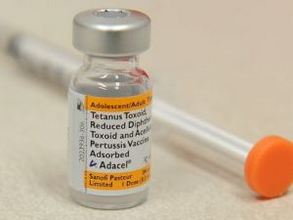The vaccine against whooping cough – DPT vakцina -Tdap vakцina
What is whooping cough?
Whooping cough is a highly contagious bacterial infection of the respiratory tract. It is caused by a bacterium Bordetella pertussis.
The spread of whooping cough:
- Inhalation wet drops From cough, the person sneezing, infected with whooping cough;
- I have direct contact with respiratory secretions of an infected person.
This infection is most common among infants and children. High-risk groups include the following groups of people:
- They, who have not been immunized;
- Living or working with native pertussis;
- Living in close proximity to potential sources of contamination (eg, dorm, nursing home);
- Living in crowded or unsanitary conditions;
- Pregnancy.
What is pertussis vaccine?
Pertussis vaccine contains small, Peeled honor microbes koklûša. There are different types of vaccines, to prevent whooping cough, including:
- DPT – introduces children to protect against diphtheria, tetanus and pertussis;
- Tdap – introduces children, adolescents and adults to protect against tetanus, diphtheria and whooping cough.
The vaccine is administered via injection, usually, in the arm or thigh.

Who and when to be vaccinated?
DPT
Vakцinaцija DPT, usually, is required before starting school. Routine immunization has the following terms:
- 2 of the month;
- 4 of the month;
- 6 months;
- 15-18 months;
- 4-6 years.
Tdap
Tdap is usually recommended for children 11-12 years, who were vaccinated with DTP. Tdap may also receive:
- Children 7-10 years, which have not been fully vaccinated;
- Children and teenagers 13-18 years, who have not received Tdap in 11-12 years;
- Adults under the age of 65 years, who have never received Tdap;
- Pregnant women after 20 weeks of pregnancy, who have not previously received Tdap;
- Adult, who have not previously been vaccinated and which come into contact with children aged 12 months and younger;
- Medical profession, who have not previously received Tdap.
Schedule of vaccinations
If you or your child has not been fully vaccinated against pertussis, talk to your doctor.
Risks, related to whooping cough vaccine
Most people tolerate the vaccine without any problems. The most common side effects are:
- Pain, redness or swelling at the injection site;
- A slight rise in temperature;
- Headache;
- Fatigue;
- Nausea;
- Vomiting;
- Diarrhea;
- Abdominal pain.
Rare symptoms include:
- Fever over 38,9 ºC;
- Severe problems of the gastrointestinal tract;
- Strong headache;
- Nervous system problems and severe allergic reactions, such as anaphylactic shock (rarely).
Sometimes given paracetamol, to reduce pain and fever, which may occur after vaccination. In children, the medication may weaken the effectiveness of the vaccine. It should discuss the risks and benefits, associated with the use of drugs with a doctor.
Who should not be vaccinated against whooping cough?
Most people should receive vaccinations on schedule. Nonetheless, there are groups of people, in which the risk of vaccination outweigh the benefits. You can not be vaccinated unless the potential grafting:
- There were life-threatening allergic reaction to DTP, ADS, Tdap or Td vaccine;
- We had a severe allergy to any vaccine component;
- They fell into a coma or had a convulsion for seven days after a dose of DTP or DTaP.
Talk to your doctor before vaccination, if you have:
- Allergiya latex;
- Epilepsy and other nervous system problems;
- Severe swelling or severe pain after a previous dose of any component of the vaccine, which will be introduced;
- Guillain Barre syndrome;
- Moderate or severe illness (Before vaccination need to recover).
What are the ways to prevent pertussis in addition to vaccination?
Isolating those with any contagious disease – the main method of preventing its spread. Important, eg, keep people with pertussis at home, until the disease has passed.
If you have been in close contact with the, who are infected with whooping cough, perhaps, will have to take antibiotics.
What happens in the event of an outbreak of whooping cough?
In the event of an outbreak, all people, which may or may be exposed to infection, You should be vaccinated. Important, protect babies, highlighting the, who has the infection. Diagnosis of the disease as soon as possible can help prevent flare.
